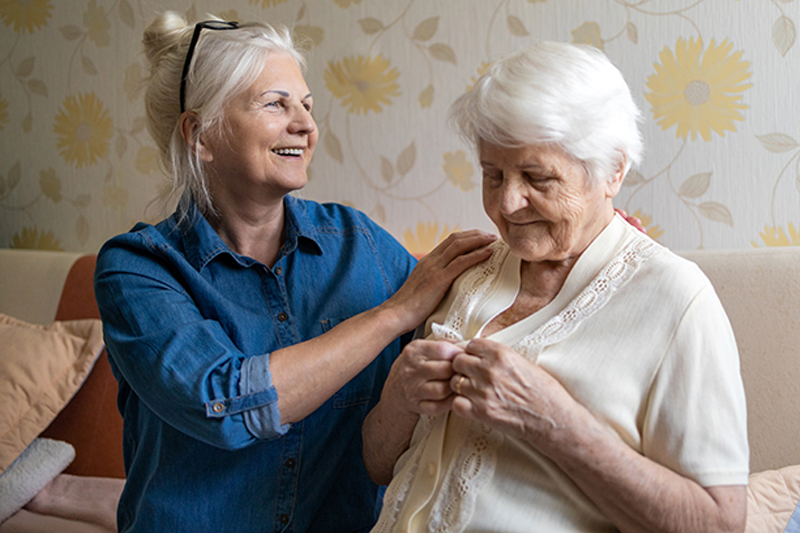
Learn about middle stage dementia symptoms and how home care services can help family caregivers.
Receiving the news that an older family member has been diagnosed with dementia is life-altering. Thinking through the many different factors and facets of the disease and its impact, both now as well as in the future, may be overwhelming.
In this three-part series, we’ll explore the early, middle and later stages of dementia. We’ll detail the type of care needed during each stage, what family caregivers should expect, and how At-Home Care Company, the senior helpers in Des Moines, IA and nearby areas, can help.
Middle Stage Dementia Caregiving
Middle stage dementia symptoms can be subtle and may be unnoticeable at first when compared with early stage dementia symptoms. Eventually, a senior in this stage will start to experience ever-increasing challenges with daily tasks, like getting dressed. It’s vital for family caregivers to continue to foster a feeling of autonomy, allowing the senior loved one to accomplish these tasks at his or her own pace as long as possible (and as long as it’s safe to do so). This calls for flexibility, patience, and adaptability.
It will become essential to invest additional time in providing care, and also to establish creative strategies and approaches to reduce frustration – for your loved one and for yourself. Self-care becomes extremely important in the middle stage of dementia in order to help caregivers manage stress.
Here is what you might expect to encounter during this stage:
Behavior Changes
- Anxiety
- Irritability
- Depression
- Repetitive behaviors
- Aggressive outbursts (physical and/or verbal)
Ways to Help
Keeping a relaxed demeanor is crucial. Do not argue or try to reason with a loved one in the middle stage of dementia. In a calm and soothing tone, acknowledge the feeling behind the behavior and offer suggestions to help. For instance: “Grandma, I can see you are feeling frustrated about misplacing your favorite shirt. It is most likely in the washing machine. This purple one looks fabulous on you; do you want to wear it today?”
Take into account that the words and actions being expressed are not a reflection of you personally, but simply part of the common development of dementia. Often, there is a fundamental emotion, such as exhaustion, fear, or hunger, driving the behavior. Attempt to identify the main cause and address that.
Communication Changes
- Losing train of thought
- Forgetting a word or phrase
- Repeating questions or statements
- Using more non-verbal communication
Ways to Help
Accept whatever kind of communication is most effective for the senior, without trying to correct him or her. Alter your communication technique to make it easier for the senior to understand and respond to you. For example, instead of asking open-ended questions (“What would you like for lunch today?”) offer a choice between just two choices (“Would you like tuna or chicken for lunch today?”). Speak in a clear, soothing tone, and allow the senior plenty of time to respond without jumping in and providing the answer yourself.
Safety-Related Changes
- Wandering
- Driving concerns
- Sundowning
In this stage of the disease, paying closer attention to safety issues becomes critical. Driving should cease – something that is usually difficult for older adults to accept. If at all possible, include the older adult in making this decision. If not, a note from the doctor prohibiting driving is usually the best way to gain his or her consent. If the senior is insistent about continuing to drive, you might need to remove the keys, or exchange his / her set of keys with nonworking ones.
Additionally, sundowning and wandering can be overwhelming and difficult for family caregivers to manage independently. Partnering with an established and dependable care provider with experience in dementia care, like At Home Care Company, is a great solution. Our senior helpers in Des Moines, IA and the surrounding areas can take the night shift, making sure that older adults are safe and distracted with interesting activities when not able to sleep – allowing family caregivers to get the rest they need.
For additional details on our specialized in-home dementia care, contact us any time at 515-292-2650.
